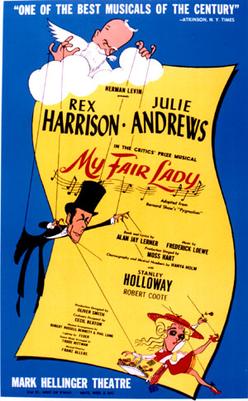
My Fair Lady is a musical with a book and lyrics by Alan Jay Lerner and music by Frederick Loewe. The story, based on the 1938 film adaptation of George Bernard Shaw's 1913 play Pygmalion, concerns Eliza Doolittle, a Cockney flower girl who takes speech lessons from professor Henry Higgins, a phonetician, so that she may pass as a lady. Despite his cynical nature and difficulty understanding women, Higgins grows attached to her.

Kiss Me, Kate is a musical written by Bella and Samuel Spewack with music and lyrics by Cole Porter. The story involves the production of a musical version of William Shakespeare's The Taming of the Shrew and the conflict on and off-stage between Fred Graham, the show's director, producer, and star, and his leading lady, his ex-wife Lilli Vanessi. A secondary romance concerns Lois Lane, the actress playing Bianca, and her gambler boyfriend, Bill, who runs afoul of some gangsters. The original production starred Alfred Drake, Patricia Morison, Lisa Kirk and Harold Lang.
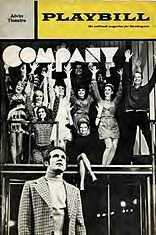
Company is a musical with music and lyrics by Stephen Sondheim and book by George Furth. The original 1970 production was nominated for a record-setting 14 Tony Awards, winning six. Company was among the first book musicals to deal with contemporary dating, marriage, and divorce, and is a notable example of a concept musical lacking a linear plot. In a series of vignettes, Company follows bachelor Bobby interacting with his married friends, who throw a party for his 35th birthday.
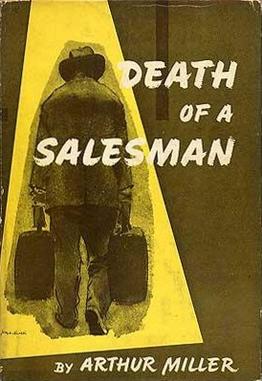
Death of a Salesman is a 1949 stage play written by the American playwright Arthur Miller. The play premiered on Broadway in February 1949, running for 742 performances. It is a two-act tragedy set in late 1940s Brooklyn told through a montage of memories, dreams, and arguments of the protagonist Willy Loman, a travelling salesman who is despondent with his life and appears to be slipping into senility. The play addresses a variety of themes, such as the American Dream, the anatomy of truth, and infidelity. It won the 1949 Pulitzer Prize for Drama and Tony Award for Best Play. It is considered by some critics to be one of the greatest plays of the 20th century. The play was selected as one of the best plays of 1948–1949, with an excerpted version published in The Burns Mantle Best Plays of 1948–1949.
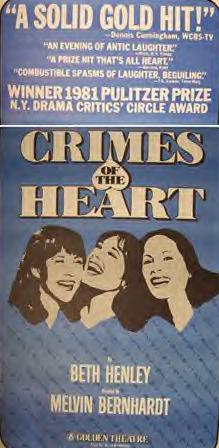
Crimes of the Heart is a play by American playwright Beth Henley. It is set in Hazlehurst, Mississippi in the mid-20th century. The play won the 1981 Pulitzer Prize for Drama and was nominated for the Tony Award for Best Play. In 1986, the play was novelized and released as a book, written by Claudia Reilly.

Mamma Mia! is a jukebox musical written by British playwright Catherine Johnson based on songs recorded by Swedish group ABBA and composed by members Benny Andersson and Björn Ulvaeus. The title of the musical is taken from the group's 1975 chart-topper "Mamma Mia". Ulvaeus and Andersson were involved in the development of the show from the beginning, while singer Anni-Frid Lyngstad was involved financially in the production and also appeared at many of the premieres around the world.

Sweet Charity is a musical with music by Cy Coleman, lyrics by Dorothy Fields and book by Neil Simon. It was directed and choreographed for Broadway by Bob Fosse starring his wife and muse Gwen Verdon alongside John McMartin. It is based on the screenplay for the 1957 Italian film Nights of Cabiria. However, whereas Federico Fellini's black-and-white film concerns the romantic ups-and-downs of an ever-hopeful prostitute, in the musical the central character is a dancer-for-hire at a Times Square dance hall. The musical premiered on Broadway in 1966, where it was nominated for nine Tony Awards, winning the Tony Award for Best Choreography. The production also ran in the West End as well as having revivals and international productions.

On the Town is a musical with music by Leonard Bernstein and book and lyrics by Betty Comden and Adolph Green, based on Jerome Robbins' idea for his 1944 ballet Fancy Free, which he had set to Bernstein's music. The musical introduced several popular and classic songs, among them "New York, New York", "Lonely Town", "I Can Cook, Too", and "Some Other Time". The story concerns three American sailors on a 24-hour shore leave in New York City during World War II, 1944. Each of the three sailors meets and quickly connects with a woman.
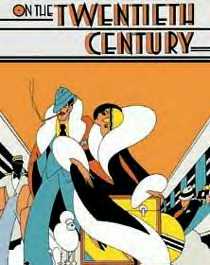
On the Twentieth Century is a musical with book and lyrics by Betty Comden and Adolph Green and music by Cy Coleman. Based partly on the 1932 play Twentieth Century and its 1934 film adaptation, the musical is part operetta, part farce and part screwball comedy. The story involves the behind-the-scenes relationship between Lily, a temperamental actress and Oscar, a bankrupt theatre producer. On a luxury train traveling from Chicago to New York in the early 1930s, Oscar tries to cajole the glamorous Hollywood star into playing the lead in his new, but not-yet-written drama, and perhaps to rekindle their romance.

Doubt, A Parable is a 2004 play by John Patrick Shanley. Originally staged off-Broadway at the Manhattan Theatre Club on November 23, 2004, the production transferred to the Walter Kerr Theatre on Broadway in March 2005 and closed on July 2, 2006 after 525 performances and 25 previews. The play won the 2005 Pulitzer Prize for Drama and Tony Award for Best Play.

Susan P. Stroman is an American theatre director, choreographer, film director and performer. Her notable theater productions include Oklahoma!, The Music Man, Crazy for You, Contact, The Producers, The Frogs, The Scottsboro Boys, Bullets Over Broadway, POTUS: Or, Behind Every Great Dumbass Are Seven Women Trying to Keep Him Alive, and New York, New York.

Proof is a 2005 American drama film directed by John Madden and starring Gwyneth Paltrow, Anthony Hopkins, Jake Gyllenhaal, and Hope Davis. The screenplay was written by Rebecca Miller and David Auburn and based on Auburn's Pulitzer Prize-winning play of the same name.
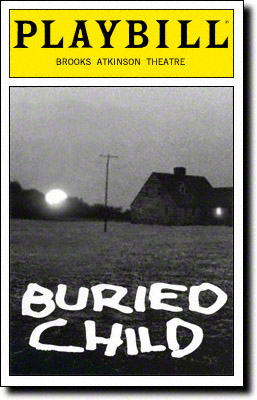
Buried Child is a play written by Sam Shepard that was first presented in 1978. It won the 1979 Pulitzer Prize for Drama and launched Shepard to national fame as a playwright. The play depicts the fragmentation of the American nuclear family in a context of disappointment and disillusionment with American mythology and the American Dream, the 1970s rural economic slowdown, and the breakdown of traditional family structures and values. In 1979, Shepard also won the Obie Award for Playwriting. The Broadway revival in 1996 received five Tony nominations, including Best Play.

Bare, also known as Bare: A Pop Opera, is a coming-of-age rock musical with music by Damon Intrabartolo, lyrics by Jon Hartmere, and a book by Hartmere and Intrabartolo. The story focuses on a group of high school students and their struggles at their private Catholic boarding school.

Spring Awakening is a coming-of-age rock musical with music by Duncan Sheik and a book and lyrics by Steven Sater. It is based on the 1891 German play Spring Awakening by Frank Wedekind. Set in late 19th-century Germany, the musical tells the story of teenagers discovering the inner and outer tumult of adolescent sexuality. In the musical, alternative rock is employed as part of the folk-infused rock score.

The Visit is a musical with a book by Terrence McNally, lyrics by Fred Ebb, and music by John Kander.

Gigi is a musical with a book and lyrics by Alan Jay Lerner and music by Frederick Loewe. It is based on the 1944 novella Gigi by Colette and 1958 hit musical film of the same name. The story concerns Gigi, a free-spirited teenaged girl living in Paris at the turn of the 20th century. She is being groomed as a courtesan in her family's tradition. Before she is deemed ready for her social debut, she encounters the bon vivant bachelor Gaston Lachaille, whom she captivates as she is transformed into a charmingly poised young lady.
The Heiress is a 1947 play by American playwrights Ruth and Augustus Goetz adapted from the 1880 Henry James novel Washington Square. Two years later, the play was adapted into the film The Heiress starring Olivia de Havilland.

Finding Neverland is a musical with music and lyrics by Gary Barlow and Eliot Kennedy and a book by James Graham adapted from the 1998 play The Man Who Was Peter Pan by Allan Knee and its 2004 film version Finding Neverland. An early version of the musical made its world premiere at the Curve Theatre in Leicester in 2012 with a book by Allan Knee, music by Scott Frankel and lyrics by Michael Korie. A reworked version with the current writing team made its world premiere in 2014 at the American Repertory Theater in Cambridge, Massachusetts. Following completion of its Cambridge run, the production transferred to Broadway in March 2015.

Dear Evan Hansen is a musical with music and lyrics by Benj Pasek and Justin Paul, and a book by Steven Levenson. The musical follows Evan Hansen, a high school senior with social anxiety, "who invents an important role for himself in a tragedy that he did not earn".
















